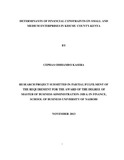| dc.description.abstract | Small and medium enterprises (SMEs) in both developing and developed countries play an
important role in the process of industrialization and economic growth. An economic survey of
2007 in Kenya puts the contribution of SMEs to employment at 78%. This figure is bound to
increase considering that the government of Kenya is keen on improving the economic and social
well being of Kenyans through initiatives such as Youth Enterpries Fund, Women Enterprise
Fund and Uwezo Fund which are intended to enable the beneficiaries set up SMEs for income
generation. It was therefore critical that a serious study was done on the existing SMEs in Kenya
so that the prospective entrepreneurs can find a document that can guide them as they get started
in business.The research objective was to establish the determinants of financial constraints of
SMEs in Kisumu County. The population of study was the 964 registered SMEs as per the
Kenya National Chamber of Commerce and Industry (KNCCI) Kisumu chapter (2013). They
were randomly sampled to come up with a representative size that formed the basis of the study.
The primary method of collecting data was employed to achieve the objective of study. Data
analysis involved organizing, accounting for and explaining the data in terms of the respondents
definition of the situation using patterns, themes and categories. The statistical package for social
sciences (SPSS) was employed in analyzing data. Majority of respodents revealed that their
business faced numerous constraints that hindered growth. Findings of the study revealed that
contribution from friends was a major source of financing accounting for 55 % of respondents.
40% of respondents indicated that they depended on loans as a financing source and only 5%
depended on personal savings. Majority of respondents indicated that lack of information was a
major constraint when sourcing for funds, accounting for 60% of the respondents. 13% of the
respondents revealed that lack of collateral was a major constraint and 27% of the respondents
indicated that transaction costs were a major constraint. Majority of respodents indicated that the
major determinanants of financial constraint included: Size of the Firm, Age of the firm, Firm
ownership, Professional experience, Level of Education, Business Strategies and Location of the
firm. These findings will be useful to policy makers and enterprenuers in finding ways to address
these obstacles. | en |

